The Secrets of . . . Who?
The different people who played a role in The Secrets of Alexis
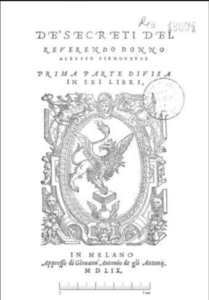
1559 Italian Cover Page; Translation: Of the Secrets of the Reverend Master Alexis of Piemonte; The First Part Divided in Six Books; In Milan
Who is the “Reverend Master Alexis of Piemont” whose secrets became so popular in the 16th and 17th centuries?
I am currently researching a 1615 English edition of The Secrets of Alexis (original Italian: De’ Secreti del Reverendo Donno Alessio Piemontese published 1555). It is a book of remedies and recipies for everything from dyes to face cleansers to medicines. For more on the book itself please see the post before: The Secrets of Alexis.
Author:
Now, finding the author of a book should be fairly simple, especially in a book where the author’s name is in the title, right? Sadly, no. Most catalouges (including my school’s) accredit Girolamo Ruscelli. This is based on a similar alchemy book he wrote, published a year after his death in 1567 called Secreti Nuovi (New Secrets). It claims to be The Secrets of Alexis’ sequel, calling Alessio Piemontese Ruscelli’s psuedonym (Bela 58). Francesco Sansovino, a friend of Ruscelli’s and who published New Secrets on his behalf, attests to Ruscelli’s authorship in his preface to New Secrets (Eamon & Phaheau 329). Battaglie (published 1582) by Hieronimo Mutio also calls Piemontese Ruscelli’s pseudonym in a passing comment (Bela 58-59).

Excerpt from Battaglie (Muzio, 63) English: “Perhaps he made this metamorphosis through the power of his alchemy, whence was born the book published under the name of Don Alexis of Piedmont” (Bela, 59)
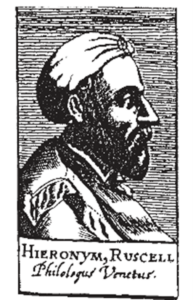
“Portrait” of Ruscelli from Theatrum Virorum Eruditione Clarorum by Paul Freher (1688, p. 1464) (Bela)
Ruscelli (1500-1566) was a humanist cartographer, writer, and “polymath” (“Map”). His works, especially the maps, were impressive, especially so for the time, including commentaries, annotations, and translations as well as collections of maps, though none garnered near the attention The Secrets of Alexis had (Eamon & Phaheau 329). His most notable contribution to cartography was the use of copper plates in place of wood, allowing for more detailed maps (“Map”). In the 1540s, living in Naples, Ruscelli was a member of the Accademia Segreta (Eamon & Phaheau 330). This society studied alchemy, testing and experimenting with the remedies that comprise The Secrets (333).

Zbigniew Bela, however, wrote a passionate piece arguing that The Secrets was actually written by a man named Alessio Piemontese (Bela 63). Alas, Piemontese is an even more obscure figure than Ruscelli, making any real argument for his authorship immensely difficult. Piemontese (est. 147o-1550) was a medic and alchemist, and in 1557, published a book of secrets in Italian (Ibid.). On page 22 verso of The Secrets, a recipe says that the water was given to him (the author) by Girolamo Ruscelli in Bologna in 1543. This suggests that Ruscelli is either sneakily inserting his name into the book by pretending to meet himself, or in fact, Piemontese was the author and Ruscelli assisted in some way or inspired some of the recipes (Bela 60).
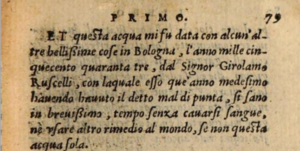
Same anecdote about Ruscelli in the 1558 Italian edition
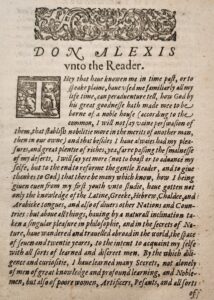 In the “To the Reader,” Alessio1 talks about his knowledge of many languages and his “singular pleasure in philosophy, and in the secrets of Nature,” adding that he travelled the world for “seven and twenty years.” He gathered his “secrets” from other learned men, noble men, “poor women, artifacers, pesants, and all sorts of men.” When Alessio was “fourscore and two year and seven months” he met a sick man, suffering from an inability to urinate. Out of his “vain glory” and fears that the physician might use his “secrets” for selfish purposes, Alessio refused share the “secrets,” and the physician, fearing others knowing he sought outside help, refused to allow Alessio to administer the medicine himself. When the man passed, Alessio was overcome with guilt, saying that he “desired to die” because he was a “murderer” for withholding his “secrets.” To help alleviate some of this guilt, he was “determined to communicate” his recipes to the public, hence this book. He assures his readers of his trustworthiness by way of his age, this story, and the promise that the recipes are “true and experimented.”
In the “To the Reader,” Alessio1 talks about his knowledge of many languages and his “singular pleasure in philosophy, and in the secrets of Nature,” adding that he travelled the world for “seven and twenty years.” He gathered his “secrets” from other learned men, noble men, “poor women, artifacers, pesants, and all sorts of men.” When Alessio was “fourscore and two year and seven months” he met a sick man, suffering from an inability to urinate. Out of his “vain glory” and fears that the physician might use his “secrets” for selfish purposes, Alessio refused share the “secrets,” and the physician, fearing others knowing he sought outside help, refused to allow Alessio to administer the medicine himself. When the man passed, Alessio was overcome with guilt, saying that he “desired to die” because he was a “murderer” for withholding his “secrets.” To help alleviate some of this guilt, he was “determined to communicate” his recipes to the public, hence this book. He assures his readers of his trustworthiness by way of his age, this story, and the promise that the recipes are “true and experimented.”
Translators:
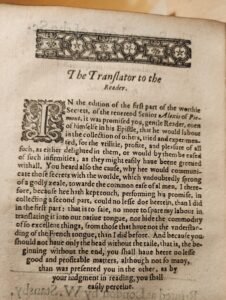 I couldn’t find much on Richard Androse, one of The Secrets’ translators, but I had more luck with the other, William Ward [Warde]. Ward (1534-1609) was a physician and translator and studied at Eton College and King’s College, Cambridge (Bayne & Wallis). He served as physician for both Queen Elizabeth I and King James I (Ibid.). He also translated several works from French to English, including The Secrets (Ibid.). It is likely from his expertise as a physician that he added recipes to the English edition as he translated it (Martins).
I couldn’t find much on Richard Androse, one of The Secrets’ translators, but I had more luck with the other, William Ward [Warde]. Ward (1534-1609) was a physician and translator and studied at Eton College and King’s College, Cambridge (Bayne & Wallis). He served as physician for both Queen Elizabeth I and King James I (Ibid.). He also translated several works from French to English, including The Secrets (Ibid.). It is likely from his expertise as a physician that he added recipes to the English edition as he translated it (Martins).
The Secrets of Alexis was printed in almost every western European language and in more than ninety editions by the end of the seventeenth century (Eamon & Phaheau 330). I found a number of digitized versions of the book (listed below).
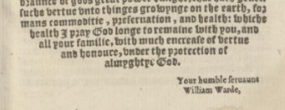
1562 Edit.’s end of Epistle
The “To the Reader” appears to be in all the editions, including the Italian. The Epistle and dedication seem unique to English editions, likely written by Ward as the 1562 edition’s ends “Your humble servant, William Warde,” though the others are nameless. Some of these editions, for example the 1595 and 1615 editions, were the same material just varying aesthetically, though others have sections numbered differently, more or fewer sections, etc. The 1580 English and 1558 Italian both have a table of contents at the end, the 1562 English and 1559 Italian have a table of contents in the middle of the work. Most of the English editions (1562, 1580, 1595, 1615, and so on) were labeled “newly corrected and amended…” editions, used the same translations, and featured the same or very similar marginal notes. It’s hard to say just how much Ward added to the English, though, without knowing more than rudimentary Italian or having a first edition.
Printer:
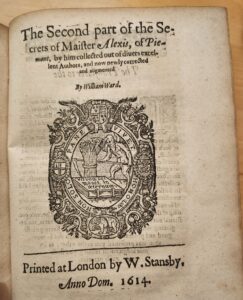 William Stansby (1572 – 1638) printed this edition in London at Cross Keys printing house. He apprenticed there under John Windet from 1589 to 1597 and then continued working with him, becoming co-partner in 1609, just before Windet’s death in 1610 (Bland). Windet focused on long print runs of small godly books, but after his passing, Stansby worked on smaller print runs of larger works and introduced more variety to the material than Windet had (Ibid.). During this period, he printed works by “John Donne, Sir Walter Ralegh, William Camden, John Selden, Michael Drayton, [and] Sir Francis Bacon,” (Ibid.) and, most famously, Ben Jonson’s first folio in 1616 (Wienberg). Stansby frequently printed banned or frowned-upon materials and was even arrested in the early 1620s for a pamphlet on Ferdinand II succeeding to the crown of Bohemia (Bland). Despite the change in focus, Stansby continued to use Windet’s printer’s device as seen on the section title pages of The Secrets (Windet). Around 1624, Stansby calmed down substantially, printing longer runs of psalms once more (Bland).
William Stansby (1572 – 1638) printed this edition in London at Cross Keys printing house. He apprenticed there under John Windet from 1589 to 1597 and then continued working with him, becoming co-partner in 1609, just before Windet’s death in 1610 (Bland). Windet focused on long print runs of small godly books, but after his passing, Stansby worked on smaller print runs of larger works and introduced more variety to the material than Windet had (Ibid.). During this period, he printed works by “John Donne, Sir Walter Ralegh, William Camden, John Selden, Michael Drayton, [and] Sir Francis Bacon,” (Ibid.) and, most famously, Ben Jonson’s first folio in 1616 (Wienberg). Stansby frequently printed banned or frowned-upon materials and was even arrested in the early 1620s for a pamphlet on Ferdinand II succeeding to the crown of Bohemia (Bland). Despite the change in focus, Stansby continued to use Windet’s printer’s device as seen on the section title pages of The Secrets (Windet). Around 1624, Stansby calmed down substantially, printing longer runs of psalms once more (Bland).
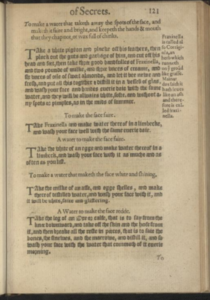
1595 Edit. page 121
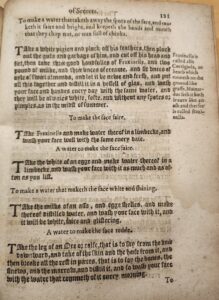
1615 Edit. page 121
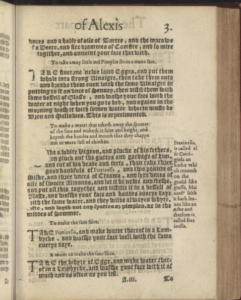
1562 Edit.’s equivalent of page 121
Works Cited
Bayne, Ronald, and Patrick Wallis. “Ward [Warde], William (1534–1609), physician and translator.” Oxford Dictionary of National Biography.January 03, 2008, Oxford University Press. https://www.oxforddnb.com/view/10.1093/ref:odnb/9780198614128.001.0001/odnb-9780198614128-e-28709. Accessed 16 October 2024.
Bela, Zbigniew. “The Authorship of The Secrets of Alexis of Piemont” Kwartalnik Historii Nauki i Techniki, vol. 61, no. 1, 2016, pp. 52-73. ResearchGate, https://www.researchgate.net/publication/11726225/Who_really_is_an_author_of_Alexis_of_Piemont’s_secrets.
Bland, Mark. “Stansby, William (bap. 1572, d. 1638), printer and bookseller.” Oxford Dictionary of National Biography. September 23, 2004. Oxford University Press. https://www.oxforddnb.com/view/10.1093/ref:odnb/9780198614128.001.0001/odnb-9780198614128-e-64163. Accessed 16 Oct. 2024
Eamon, William and Françoise Paheau. “The Accademia Segreta of Girolamo Ruscelli: A Sixteenth-Century Italian Scientific Society.” Isis, vol. 75, no. 2, 1984, pp. 327–42. JSTOR, http://www.jstor.org/stable/231830. Accessed 16 Oct. 2024.
“Map Maker Biography: Girolamo Ruscelli (1500 – 1566).” New World Cartographic, 6 Dec. 2021, https://nwcartographic.com/blogs/essays-articles/map-maker-biography-girolamo-ruscelli-1500-1566. Accessed 16 Oct. 2024
Martins, Julia. “The Secrets.” Cems KCL Blog, 14 July 2023. https://kingsearlymodern.co.uk/ key-texts/the-secrets. Accessed 21 November 2024
Muzio, Girolamo [Hieronimo Mutio]. Battaglie. Pietro Dusinelli, 1582, pp. 63, Internet Archive, https://archive.org/details/bub_gb_NQTWowCoq0sC/page/n153/mode /2up?view=theater.
Ruscelli, Girolamo. The Secrets of Alexis [Pseud.]: Containing Many Excellent Remedies against Divers Diseases, Wounds, and Other Accidents. With the Manner to Make Distillations, Parfumes … and Meltings … Newly corrected and Amended, and also Somewhat more enlarged in certaine places, Which wanted in the former editions., Printed by W. Stansby for R. Meighen, 1615. 2
Wienberg, Abbie and Elizabeth DeBold. “The Other First Folio.” Folger Shakespeare Library, July 2019, https://www.folger.edu/blogs/collation/the-other-first-folio/. Accessed 11 Oct. 2024
Windet, Micheal. “Adventures in Family Research.” The Stationers’ Company, 16 March 2021, https://www.stationers.org/news/archive-news/adventures-in-family-research. Accessed 12 October 2024
Work Consulted
“Archaeologica Medica: XXXII.-“The Secrets of Alexis.”.” British Medical Journal, vol. 2, 10 July 1897, 90-1.
De La Cruz-Cabanillas, Isabel. “The Secrets of Alexis in Glasgow University Library MS Ferguson 7.” SEDERI: Yearbook of the Spanish and Portuguese Society for English Renaissance Studies, vol. 30, Jan. 2020, pp. 29–46. EBSCOhost, https://doi.org/10.34136/sederi.2020.2.
Digitized Volumes and Collections:
Library of Congress Collection: https://lccn.loc.gov/49043523
Internet Archive: 1559 Italian Edition https://archive.org/details/BIUSante_pharma_res018694/mode/2up
Google Books: 1558 Italian Edition https://www.google.com/books/edition/De_Secreti_del_reverendo_donno_Alessio_P/wL6o6xxP7TEC?hl=en&gbpv=0
Early English Books via ProQuest:
1595 Edition https://www.proquest.com/docview/2240876695?accountid=10506&sourcetype=Books&imgSeq=1
1580 Edition
https://www.proquest.com/docview/2240906757?pq-origsite=primo&sourcetype=Books&imgSeq=1
Footnotes:
- I am using the name “Alessio” to refer to the author, not to make any statements as to who the author really is, just to use the name the “To the Reader” is signed, specifically the Italian form of the name because the “To the Reader” was the only of the front matter to exist in the original Italian, meaning these were the original author’s words, not a translator or English editor’s addition.
- This is the citation for the edition of The Secrets I worked with based on the Dickinson College Library Catalogue, which, like many catalogues, accredits the book to Ruscelli.
Good work, Evangeline!
Interesting take on *The Secrets of Alexis*! Each character played a key role, shaping the mystery like carefully chosen *decor*. Loved how Alexis’ past unraveled—perfect *anniversary gift* for suspense fans!